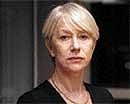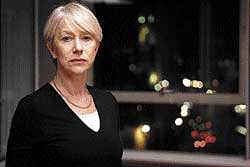

Perhaps because they belong to television we haven’t taken them as seriously as James’ Dalgliesh, Rendell’s Wexford, Dexter’s Morse, Elizabeth George’s Lynley, Rankin’s Rebus, Harvey’s Resnick, Mankell’s Wallander and (most recently) Billingham’s Thorne. As a fan and student of the genre I’m convinced that there isn’t a more interesting modern female detective than Jane Tennison and that, thanks to Helen Mirren’s deeply resonant portrayal of her and the realistic-detailed style of Prime Suspect, that it’s the greatest mystery series ever on television. Make that cinema, too.
To me what set apart Prime Suspect from other mysteries is one key element: That the focus of all the dramatic tension and suspense in the series is not whodunit but the electrifying face off between Tennison (with her team) and her prime suspect in the interview/interrogation room. They have some evidence but not enough to convict the suspect. Tennison has to close in tighter and tighter during interrogation, until there is a confession or an admission of guilt. The whole thing comes down to that closing half hour in the interview room. With whodunits, even the best of them, your interest flags once the killer is revealed; here you can return again and again to see how, inch by inch, Tennison and her team put their case together.
DCI Jane Tennison is also Mirren’s career best. You could say that Mirren was lucky to get a chance to play such a finely imagined, strong character that deepened and changed as the series progressed. But Plante and Tennison were even luckier to have Mirren. More than half the allure and greatness of Prime Suspect is Mirren’s performance. This becomes clear when you see the other compelling crime dramas that Plante created, ‘The Commander and Trail and Retribution’ and the female detectives in it, Amanda Burton as Superintendent Clare Blake and Victoria Smurfit as DCI Rosin Connor, are interesting but not as riveting as Mirren. Commenting on her work in the series, Esquire called it, “The most sustained example of great acting in the history of television.”
Mirren modestly explained it away with: “Jane’s really weird for me, because I never think about her, not for one second. Of all the characters I’ve ever played, Jane is the one I’ve most allowed just to be. I walk out on the set and let it happen.” In 1991, Prime Suspect broke new ground in television by creating a gritty, deeply detailed and realistic police procedural drama. Even newer and bolder was to put, in the career of Jane Tennison, a woman’s “professional and psychological life squarely centre stage.” And Mirren’s performance “finally enabled a real contemporary woman to break through the skin of television’s complacency.” Plante decided from the start that she wanted it to be different from the cozy English mysteries that had swamped British TV programming.
She planned for the script to be exacting, taut, following actual police work (in the Incident room where the case is discussed) and technique closely, showing a knowledge of criminal psychology. Her detective would be complicated, difficult, ambitious, smart, hard working. She would be the highest ranking female police officer in the UK having to take on big and sensitive murder cases even as she daily confronted sexism from her male colleagues and condescension from her superiors. To this Helen Mirren brought vulnerability, intelligence, cool, and a crackling nervous energy as the hard drinking, chain smoking Jane Tennison. (Plante deliberately did not give Tennison any of those affections fictional detectives have: The poetry writing Dalgliesh, the jazz aficionado Resnick, and so on).
Some of the best scenes in the series are the confrontations between the upper echelons of the London Metropolitan Police and her, the department politics, infighting and cover-ups, and the way she ultimately wins the respect of her male dominated squad. The series had only one actress in mind for the role. Plante remarking on Mirren said: “There’s a stillness to her, a great tension and intelligence in her face.” And Mirren on Tennison: “Women are taught to smile, to be pleasant, to be charming, to be attractive. Tennison doesn’t do that. She is driven, obsessive, vulnerable, unpleasantly egotistical, and confused. But she is damn good at what she does and is totally dedicated.”
In the last installment of Prime Suspect — seven in the series and titled ‘The Final Act’, Tennison is alone, plagued by self doubts, having alienated several partners over the years because of the demands of the job. She is turning alcoholic, finishing the half glass of vodka from the night before for breakfast. She is also DSI now-detective superintendent — supervising several murder cases. Tennison, on the verge of retirement, steals a case that was rightly her juniors’ by pulling rank. Though ashamed of this, she is desperate to throw herself into work and do what she does best: Cracking complex crime cases.
It’s superb the way the series stays faithful to her character right to the end: its creators didn’t compromise and give her a fluffy ending and make things okay for her. The years of working and living the way she has now takes toll. As one critic noted: “The character might have had a chance at happiness had she been a mere cliché, cardboard and hard-boiled, but Mirren went and made her as vivid as life itself.”
Writing about Jane Tennison, Alessandra Stanley of the New York Times wrote: “For all her flaws and brusque schoolmarmish cool, Tennison has a special sensitivity to victims, a repressed compassion that fuels her zeal to see justice done.” When a teenager asks her in this last episode what made her become a police detective, she replies: “It was the power. The freedom. And the stupid thought you could do some good.”
Mirren had stellar support from her co-actors, several of whom appear through the series, and the ensemble acting has always been first rate with a great deal of authenticity and underplaying. The various directors of the show, and especially Christopher Menaul who did the first, should be credited with establishing the unmistakable style of Prime Suspect — busy, crackling, terse, restrained, ironic, understated — that brought a new television — verite atmosphere to a mystery series. Our retail movie stores are full of DVDs of Poirot and Morse and Marple, but I wish they would stock Prime Suspect. Even those obliging video pirates at National Market haven’t delivered.